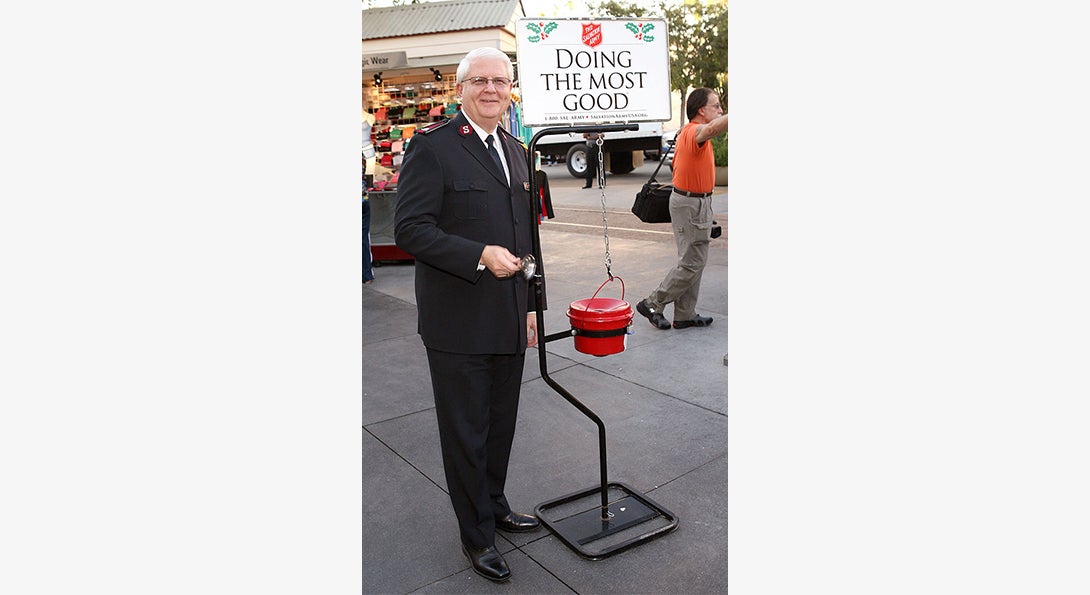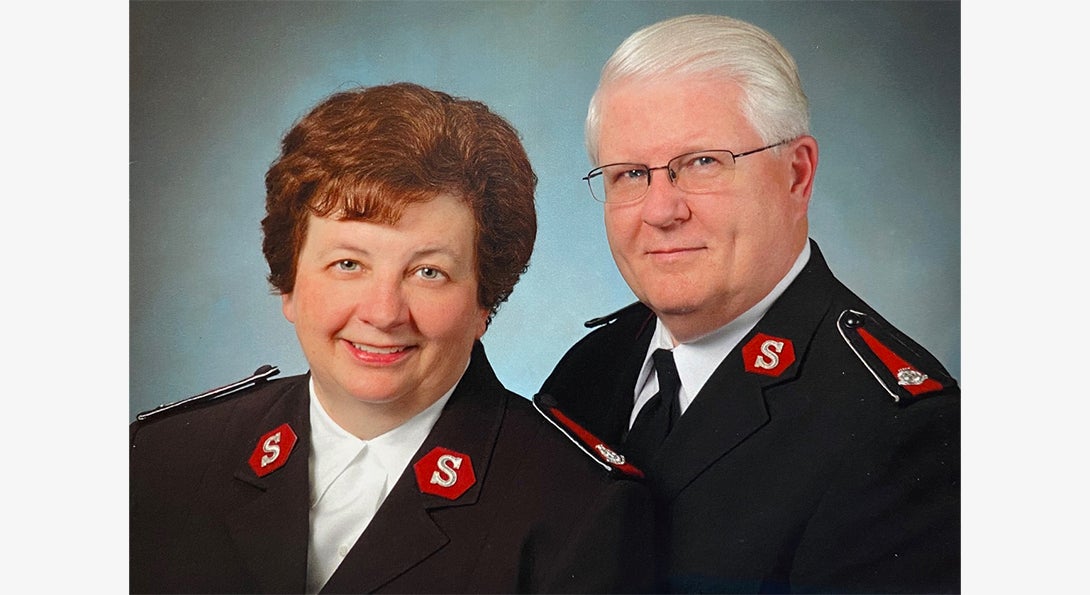Answering the Bell

Bollwahn’s JACSW Education Provided Salvation to Those Who Needed a Lift
Paul Bollwahn knew what his career path was going to take at the age of four.
Each day Bollwahn, MSW ‘71, watched his mother and father don their Salvation Army uniforms and leave their Wisconsin home to travel to the local office to help individuals who were less fortunate than their family. Although still quite young, Bollwahn was eager to experience the same gratification his parents received from their honorable deeds as he grew older.
As a kindergartner in Oshkosh, Wisc., Bollwahn befriended a new classmate whose father was a rabbi. The parents met, and Bollwahn’s father learned that the Jewish congregation was without a worship center. Each Friday evening thereafter, Bollwahn’s father opened the doors to the local Salvation Army center and welcomed the congregation to use the building until a permanent structure was secured.
Word quickly spread throughout the city of nearly 60,000 of The Salvation Army’s services and generosity, and soon it was aiding more organizations: providing camping opportunities to Boy and Girl Scouts, connecting adults with employment, teaching music lessons after school, and helping people through food and rent assistance programs, among many other endeavors. During his final two years of high school, Bollwahn accompanied kids of needy families to summer camp, where he also worked as a lifeguard. The experiences only heightened his desire to live his life in service.
The Salvation Army, founded in 1865 in London by one-time Methodist preacher William Booth and his wife, Catherine, is synonymous with volunteers ringing a bell seeking donations in a red kettle during the Christmas season. The money is used to not only provide gifts to children during the holidays, but food, shelter, and utility assistance to individuals who need it throughout the year. Today, The Salvation Army is the largest non-government provider of social services in the United States and one of the largest in the world, with expenditures including operating costs of $3.6 billion in 2022, and assisting more than 32 million people in the U.S. alone.
Salvation Army officers – Bollwahn’s parents were both captains – are given “marching orders” every two to five years and reassigned to different posts. Bollwahn, ACSW, CSWM, who rose to the rank of lieutenant colonel, and his parents moved throughout Wisconsin - to Beloit, Janesville, Sheboygan, and Milwaukee.
Being musically inclined as a youth, Bollwahn left Wisconsin following high school and moved to Lincoln, Neb., to work for a year (one of his three part-time jobs was driving a school bus for the local Salvation Army center) before entering the University of Nebraska to study music. But he felt unfulfilled. His calling was helping others, and after two years he transferred to Olivet Nazarene College (now University), changing his major to social work.
“The state hospital in Kankakee (a 15-minute drive from the Bourbonnais, Ill., campus) offered part-time, then full-time, social work and excellent tutorial guidance,” Bollwahn said. “I met my wife of 59 years at Olivet, and together we decided to give our lives to service through The Salvation Army.”
Bollwahn quote
My life since Jane Addams would not have been possible without the excellent education I received there.
Bollwahn story continues

Photo courtesy of Ronda and Paul Bollwahn
Upon graduation from the JACSW, Bollwahn served as the leader of the Rehabilitation Center of Chicago. He arrived one morning to learn that a client had left to return to his hometown of Springfield, Ill., without completing the program. Bollwahn felt the young man had a bright future, and he was saddened to learn of his decision. But it was short-lived. Hitch-hiking the 200 miles downstate left a lot of time for the young man to think. Later that evening he returned to Bollwahn’s office, expressing his interest to re-enter the program.
“His life changed during his travels,” Bollwahn said. “I was so happy he returned. The young man was so inspired that he later became an employee.”
Following his graduation from the JACSW, Bollwahn served in numerous capacities within The Salvation Army throughout the United States – director of social services in Missouri and Southern Illinois; director of social services in Chicago; director of social services in Peoria, Ill., and 28 surrounding communities; director of congregational centers, camps and residential centers in St. Louis; and territorial social services director for 11 Midwest states.
In 1995, Bollwahn was named The Salvation Army’s national social services secretary in Washington. He worked with the organization’s state groups overseeing numerous services, and Ronda (who also was a lieutenant colonel) scheduled and prepared conferences with state and local headquarters. He also assisted with and represented The Salvation Army with international conferences in Russia, Sweden, New Zealand, Switzerland, Finland, Malaysia, Hong Kong, South Africa, and Jerusalem.
After 11 years in Washington, Bollwahn was once again called to a different post, being named divisional commander of The Salvation Army’s Southern California Division. As he did previously in St. Louis and Chicago, Bollwahn prevented the loss and closure of much-needed community programming while enhancing program development and fundraising in the Los Angeles area. For his work, he was granted the Lifetime Achievement Award by the National Association of Social Workers California Chapter.
Throughout his nearly 40-year Salvation Army career, Bollwahn was frequently recognized for his accomplishments – the National Association of Social Work Foundation bestowed the Pioneer Award on him, and the National Reference Insitute named Bollwahn to the list of Who’s Who Among Service Professionals. He was also presented with a Certificate of Commendation from the United States Department of Health and Human Services.
Bollwahn has also testified before Senatorial committees and worked with coalitions and the United States Department of Agriculture (USDA) on food scarcity for the poor, advocating product research, food recovery and greater organizational competence and utilization of the food bank system. He also developed and provided oversight to The Salvation Army to bring the scourge of international human sexual and labor trafficking to the consciousness of America’s churches, the federal government and the International Salvation Army that operates in 133 countries throughout the world.
Bollwahn retired from The Salvation Army in 2008, leaving southern California to be closer to his family in Denver. But social work never left him. He served for six years as assistant counselor at Denver’s Salvation Army Adult Rehabilitation Center before finally slowing down to enjoy his passions of golfing, taking walks, going to the movies, shopping at farmers markets and riding bicycles with his grandchildren.
“The Salvation Army provided me a great career, and the Jane Addams College of Social Work afforded me the education and confidence I needed to make my dreams come true,” Bollwahn said. “I am sure I join many professionals who are thankful for our preparatory time at Jane Addams.”